Epistemic Modality Degrees of Chinese Fortune Sticks’ Prophecies: A Case Study of Watthaisamakkhee’s Prophecies in Chinese fortune sticks
Keywords:
Degrees of semantic denotations in epistemic modality, Prophecies, Chinese fortune sticksAbstract
Abstract
The practice of Chinese fortune sticks is a kind of fortune-telling that can be accessed easily by all genders and all ages while visiting the temples in Thailand for them to make merit. In addition, it is popular activity among Thai people. This study examined degree of epistemic modality in Chinese fortune sticks’ prophecies that appear in different topics, such as finance, work, health and love. The data collection was gathered from Watthaisamakkhee, Mae Kasa, Mae Sot District, Tak Province. To ensure the reliability of the written prophecies used in this study, the researcher selected the written prophecies translated by an assistant professor from a prestigious university in Thailand. The data collection in this study was 28 written prophecies translated into English which were made up of 49 sentences. The data collection was collected in Microsoft Excel. The data analysis followed thematic analysis by Braun and Clarke (2006), which are divided into 6 stages for qualitative analysis. The results in this study show that the epistemic modality with the level of probability was the highest at 93.88 percent. Moreover, approximately 90 percent of the written prophecies were written with positive semantic denotations, while only 10 percent were written with negative semantic denotations. It is expected that the results of this study will be useful for learners of English as a Foreign Language (EFL) in order to study epistemic modality marked in different texts and be able to apply them in actual use correctly and approximately.
References
Bishop, E. & Willis, K. (2014). Without hope everything would be doom and gloom: Young people talk about the importance of hope in their lives. Journal of Youth Study, 17(6),778-793.
Broman, B., & Warren W. (2005). Spiritual Abodes of Thailand. Marshall Cavendish.
Braun, V., & Clarke, V. (2006). Using thematic analysis in psychology. Qualitative research in psychology, 3(2), 77-101.
Chalermsan, N., & Weeraphan, P. (2022). Legal measures designed to control fortune telling. Journal of MCU Nakhondhat, 9(9), 106–119.
Dicksona, M. W., Hartogb, D. M., Mitchelson, J. K. (2003). Research on Leadership in a cross-cultural context: Making progress, and raising new questions, The Leadership Quarterly, 14(1), 729–768.
Hofstede, G. (2011). Dimensionalizing cultures: The Hofstede model in context. Online Readings in Psychology and Culture, 2(1), 8-26.
Hu, C., & Li, X. (2015). Epistemic modality in the argumentative essays of Chinese EFL Learners. English Language Learning, 8(6), 20-31.
Jorgensen, D. L. (1982). Social meaning of the occult. The Sociological Quarterly, 23(3), 375-381.
Lillian, H. C., & Jeanette S. M. (2012). Intercultural Business Communication. Pearson Education.
Martín, P. M. (2001). Epistemic modality in English and Spanish psychological texts. Revista de Lenguas Para Fines Específicos, 8(1), 195-208.
McEnery, T., & Kifle, N. A. (2002). Epistemic modality in argumentative essays of second language writers. Academic discourse, 19(1), 182-195.
Neulip, J. W. (2020). Intercultural Communication: A Contextual Approach. Sage.
Phonpirut, P., & Sakakorakul, S.. (2010). Willingness to pay to the fortune teller. Thailand and The World Economy, 28(2), 107–126.
Rattanapian, S. (2017). An analysis of Kau Cim prophecies in the Thai context. Human and Social Science, 34(1), 32-68.
Sathirawatkul, N. (2022). A study of translation strategies in prophetic cards for shrines and
temples in Bangkok area. Lawarath Social E – Journal, 4(3), 85–110.
Sawangboonsatit, K. (2018). The medium of Chinese fortune stick for health: Discourse analysis. Journal of Liberal Arts, Rangsit University, 9(1), 38-53.
Servaes, J. (2000). Reflections on the differences in Asia and European values and communication Modes. Retrieve From http://home.scarlet.be/~tor-3018/servaes_singapore.pdf
Skinner, B. F. (1990). Can psychology be a science of mind? American psychologist, 45(11), 1206-1211.
Swan, W. (2016). Practical English usage. Oxford: Oxford University Press.
Tancharoenphanit, R. (2010). Attitudes of clients towards fortune telling: A case study in Chonburi. Master Thesis, Thammasat University, Thailand.
Vongvipanond, P. (1994). Linguistic Perspectives of Thai Culture, the University of New Orleans, Retrieve from http://www.thaihealingalliance.com/membersonly/ Research_and_Other_Items_of_Interest/Linguistic%20Perspectives%20of%20Thai%20Culture.pdf
Wongkittiporn, A. (2021). Epidemic modality in English Buddhist texts. Journal of Language, Religion and Cultures, 10(2), 174-200.









